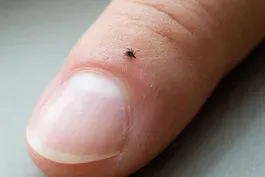
The impact of reversing Roe
Clip: 5/19/2024 | 6m 40sVideo has Closed Captions
How the reversal of Roe v. Wade reshaped American life
It's been nearly two years since the Supreme Court overturned Roe v. Wade and eliminated the federal right to abortion. Shefali Luthra, a health reporter at The 19th News, spoke to a variety of Americans about how their lives have been upended by the court's decision for her book, "Undue Burden: Life and Death Decisions in Post-Roe America.” She joined Laura Barrón-López to discuss.
Problems with Closed Captions? Closed Captioning Feedback
Problems with Closed Captions? Closed Captioning Feedback
Major corporate funding for the PBS News Hour is provided by BDO, BNSF, Consumer Cellular, American Cruise Lines, and Raymond James. Funding for the PBS NewsHour Weekend is provided by...

The impact of reversing Roe
Clip: 5/19/2024 | 6m 40sVideo has Closed Captions
It's been nearly two years since the Supreme Court overturned Roe v. Wade and eliminated the federal right to abortion. Shefali Luthra, a health reporter at The 19th News, spoke to a variety of Americans about how their lives have been upended by the court's decision for her book, "Undue Burden: Life and Death Decisions in Post-Roe America.” She joined Laura Barrón-López to discuss.
Problems with Closed Captions? Closed Captioning Feedback
How to Watch PBS News Hour
PBS News Hour is available to stream on pbs.org and the free PBS App, available on iPhone, Apple TV, Android TV, Android smartphones, Amazon Fire TV, Amazon Fire Tablet, Roku, Samsung Smart TV, and Vizio.
Providing Support for PBS.org
Learn Moreabout PBS online sponsorshipLAURA BARRON-LOPEZ: It's been nearly two years since the Supreme Court overturned Roe vs. Wade and eliminated the federal right to abortion.
The reversal marks the start of a new era in the U.S. as some states rush to prohibit abortion.
But the new laws didn't just affect those states that implemented them.
Shefali Luthra is a health reporter at the 19th News.
She has spent the last two years traveling the country speaking to people from very different backgrounds, about how their lives have been upended by the court's decision.
Her book "Undue Burden, Life and Death Decisions in Post-Roe America" is out on Tuesday.
Shefali thanks for being here.
SHEFALI LUTHRA, 19th News: Thanks so much for having me.
LAURA BARRON-LOPEZ: Many of the abortion stories highlighted since Roe fell have been some of the scariest, ones about people who would die if they didn't get an abortion and you say in this book that it's your attempt to correct that narrative, that people get abortions for all kinds of different reasons, and that those stories equally deserve to be told, what are some of those stories in the states that have either banned or severely restricted abortion?
SHEFALI LUTHRA: The most common reason people get abortions is simply they can't afford to have another kid.
Very often people who get abortions are already parents.
They know intimately how much it costs, the emotional, the physical, all of the energy it takes to raise a child.
They are often in their 20s.
They are often women of color.
It is women of all ages, people of all gender identities, trans people as well.
And they have all sorts of reasons for not wanting to be pregnant.
LAURA BARRON-LOPEZ: You traveled the country for years before Roe was overturned.
And since it was overturned, how has it changed for health care providers in states where the procedure is still legal.
SHEFALI LUTHRA: Even in states where abortion is legal, there is really intense fear and pressure and burnout on the physicians who are caring, not only for people in their own state, but for the people who have traveled, sometimes hundreds of miles to get there.
I can think of doctors I've met in Florida and in Kansas who are just overwhelmed because they are caring for patients sometimes going up until midnight, because they know that if people don't get an abortion in their clinic today, they will never have the opportunity.
It's really a tremendous burden placed upon these providers because they come home, carrying their patients fears their patients groups and their own stress about what they're doing the physical burden of traveling, the emotional knowledge that what you are doing, what you have been taught is safe medical care, is in so many places no longer allowed.
LAURA BARRON-LOPEZ: You write about so many of those patients in the book, one of those people is Angela, a young Latina mother in her 20s living in Texas.
She already had one kid and she was concerned about the fact that that could drive her into even further debt.
She had to travel to New Mexico to receive two abortion medications.
And again, she didn't know how she and her boyfriend were going to pay for bills.
I bring that up because that story sounds a lot like the story of a young transgender girl that I interviewed last year.
You write that these two issues, abortion access, and gender affirming care for transgender people are connected.
Why?
SHEFALI LUTHRA: If we look at the Venn diagram of states that have banned abortion, and of states that have restricted access to gender affirming care, especially for minors, it's largely a circle.
They are outlining healthcare that is life affirming, and in some cases, life-saving, and they're doing so often in the face of medical guidance.
What we also know is that many health care providers who provide abortion also provide gender affirming care.
They are under dual attack by lawmakers unable to provide what they believe and know to be the best medical care because of the political reality that many people view gender based healthcare as needing to be regulated or outlawed.
LAURA BARRON-LOPEZ: Patients living in states that have restrictive laws, not where abortion is fully banned.
But severe restrictions are worried about missing that window based on their state's law.
So how have they been affected and all of this?
SHEFALI LUTHRA: There's a young man in the book named Jasper who lives in Florida and gets an abortion.
And when he got an abortion, it was legal up to 15 weeks in Florida.
He found out very close to that deadline.
He had about one week to make his appointment to go through Florida's two mandated state visits, and to decide that he wanted an abortion to begin with.
This is a really personal decision that he wanted to spend time with.
And instead he had to rush through it.
He didn't want to tell his family because they didn't agree with abortion.
So he had to sit with this secret for a week, wondering for months afterward if this was actually what he wanted to do but knowing that if he didn't decide quickly, he wouldn't have had a choice.
LAURA BARRON-LOPEZ: Speaking of Florida, it was previously a state where a number of people went to receive abortions, but Republicans there implemented a six week man earlier this month, what does it mean for Floridians as well as people all across the south?
SHEFALI LUTHRA: That ban is one of the most important bands who have taken effect since Roe v. Wade was overturned.
Florida was the premier access point for abortion in the South.
There were more than 84,000 abortions in the state last year, a large share from people from neighboring states who had nowhere closer to go.
Even though Republicans in the state said they wanted to settle at a 15-week compromise.
That wasn't the reality.
And it also shows us that we are living in a country where roughly half of the nation does not live anywhere near an abortion and has to travel as far say from Miami to Virginia or North Carolina or even New York to get healthcare.
LAURA BARRON-LOPEZ: Polls often say that abortion is maybe not as salient as it was immediately after the fall of Roe.
But as you travel across the country, do you hear fears about a national abortion ban amongst the people that you speak to?
SHEFALI LUTHRA: The people I interviewed did not think that much about abortion as a political issue until it affected them.
And now that it has, it is something that they think about constantly.
They feel as if they are not equal citizens in this country.
They feel as if they are treated as less because of their gender.
This absolutely will shape how they vote.
I think the question is, as you pointed out, whether that same prioritization and level of concern will extend to people who don't realize what they have, which is that this really could affect any one of us.
LAURA BARRON-LOPEZ: Shefali Luthra of the 19th News, thank you for your reporting and this fascinating book.
SHEFALI LUTHRA: Thank you so much for having me.
Video has Closed Captions
What more can be done to treat Lyme disease and its potential long-term effects (6m 51s)
‘Stop the Steal’ flag at Alito’s home raises concerns
Video has Closed Captions
‘Stop the Steal’ flag at Supreme Court Justice Alito’s home raises concerns (7m 6s)
Providing Support for PBS.org
Learn Moreabout PBS online sponsorshipSupport for PBS provided by:
Major corporate funding for the PBS News Hour is provided by BDO, BNSF, Consumer Cellular, American Cruise Lines, and Raymond James. Funding for the PBS NewsHour Weekend is provided by...













